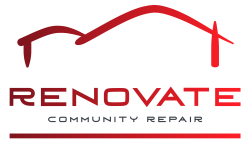HEALTH & SAFETY
Health & Safety Policy Document v1.0
Document: F
Effective Date: 1 January 2025
Version: 1.0
1. Introduction
Renovate Community Repair C.I.C (“RCR,” “we,” “us,” or “our”) prioritises the health, safety, and welfare of our employees, clients, and the public. This policy complies with the Health and Safety at Work Act 1974, Management of Health and Safety at Work Regulations 1999, and guidelines from the Health and Safety Executive (HSE).
2. Objectives
- Minimise risks through proactive hazard identification and control.
- Provide safe working environments for employees and clients.
- Ensure compliance with all relevant UK health and safety legislation.
3. Risk Assessments
3.1 Pre-Work Assessments
- Conducted by: RCR Site Supervisor.
- Scope: Identify hazards (e.g., asbestos, electrical risks, structural instability).
- Documentation: Recorded on HSE-compliant forms and retained for 6 years.
3.2 Hierarchy of Controls
1.Elimination (e.g., remove hazardous materials).
2.Substitution (e.g., use low-VOC paints).
3.Engineering Controls (e.g., ventilation systems).
4.Administrative Controls (e.g., training, signage).
5.PPE (last line of defence).
3.3 Safe Isolation Procedures
To prevent harm from electricity and gas during work:
- All electrical circuits must be safely isolated before work using lock-off devices and test-before-touch methods in accordance with HSE Guidance GS38.
- Gas isolation must be carried out by Gas Safe registered engineers using appropriate valve controls and signage.
- Only authorised personnel may re-energise isolated systems, following confirmation of safe conditions.
4. Personal Protective Equipment (PPE)
4.1 Mandatory PPE
| Task | Required PPE |
| Electrical Work | Insulated gloves, voltage tester, goggles |
| Plumbing/Gas Work | Safety goggles, flame-resistant overalls |
| General Construction | Hard hats, steel-toe boots, hi-vis vests |
4.2 Maintenance
- Inspect PPE before each use.
- Replace damaged equipment immediately.
5. Training & Competency
5.1 Mandatory Training
- Gas Safe Registration: For boiler servicing and gas repairs.
- NICEIC: For electrical installations.
- Asbestos Awareness: Renewed every 3 years.
- Manual Handling: Annual refreshers.
- Safe Isolation Procedures (Electrical and Gas): Annual refresher for all maintenance operatives.
- Legionella Awareness: Biennial training for operatives accessing water systems.
5.2 Records
- Training records stored securely for 10 years.
5.3 Toolbox Talks
- Monthly safety briefings (“Toolbox Talks”) are mandatory for all site operatives and volunteers.
- Topics include: Safe isolations, manual handling, ladder safety, asbestos awareness, and site-specific hazards.
6. Incident Reporting
6.1 RIDDOR-Reportable Incidents
- Examples: Fractures, burns requiring hospitalization, gas explosions.
- Process: Report to HSE within 14 days via HSE’s online portal.
6.2 Near Misses
- Log internally using Form HS-01. Investigate root causes within 48 hours.
7. Emergency Procedures
7.1 Gas Leaks
1.Evacuate the property.
2.Call National Grid: 0800 111 999.
3.Isolate gas supply at the meter using correct valve control (if safe) and apply lock-off/tag-out device if required.
7.2 Electrical Fires
1.Cut power at the consumer unit.
2.Use CO₂ extinguishers (never water).
3.Dial 999 if uncontainable.
8. Hazardous Materials
8.1 Asbestos
- Discovery Protocol:
1.Cease work immediately.
2.Notify RCR Asbestos Coordinator (0333 200 8801).
3.Arrange licensed removal by UKAS-accredited contractors.
8.2 COSHH Compliance
- Safety Data Sheets (SDS) for all chemicals (e.g., solvents, adhesives).
- Store hazardous substances in locked cabinets.
8.3 Legionella Control Measures
To prevent Legionnaires’ Disease risks:
- Water systems in any unoccupied or vacant properties under our care will be risk assessed per HSE Approved Code of Practice L8.
- Where risk is identified, flushing of unused outlets, regular water temperature checks, and descaling of shower heads will be scheduled.
- All operatives must report signs of stagnant water or foul odours immediately to the Safety Officer.
9. Equipment Safety
9.1 Tools & Machinery
- PAT Testing: Annual Portable Appliance Testing for electrical tools.
- LOLER Inspections: Lifting equipment examined every 6 months.
- Isolation Equipment: (Lockout/Tagout devices) must be inspected biannually and logged.
9.2 Ladder Safety
- Follow PASMA standards.
- Never exceed 75% load capacity.
10. Client Responsibilities
- Provide safe access to work areas.
- Disclose known hazards (e.g., fragile floors, vermin infestations).
- Follow RCR safety instructions during work.
11. Monitoring & Compliance
11.1 Audits
- Quarterly HSE compliance audits by RCR Safety Officer.
- Corrective actions logged and tracked via Safety Management System.
11.2 Penalties for Non-Compliance
- Employees: Disciplinary action up to termination.
- Clients: Service suspension until hazards are resolved.
11.3 Policy Review & Legislative Updates
- This policy will be reviewed every 12 months, or sooner if there are legislative changes or after a major incident.
- Reviews will be overseen by the Health & Safety Officer in consultation with senior management.
12. Contact Information
- Health & Safety Officer:
Email: safety@renovatecommunityrepair.co.uk
Phone: 0333 200 8800 (24/7) - HSE Hotline: 0300 003 1747
Download Full PDF | Document F | Health & Safety Policy
© 2024 Renovate Community Repair C.I.C. All rights reserved.
This policy adheres to HSE, COSHH, and RIDDOR requirements, ensuring a robust framework for risk mitigation and legal compliance.
